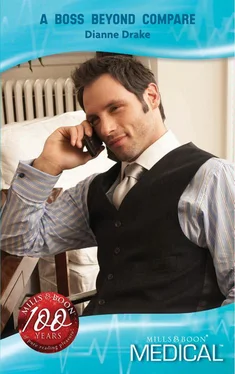“Other than buying the clinic—what I hoped would be my clinic—and changing everything we’re about?”
“But we’re not! Yes, we’re in the process of a nice deal on Oahu, but I know what properties we’re looking at and this isn’t one of them.” It would be an ideal place for one of their clinics, she had to admit, but the Kahawaii name wasn’t on the list.
“The hell it isn’t! Mrs Kahawaii is in negotiations now, and she’s indicated to me that she intends on signing the deal within the next couple of weeks, if I can’t come up with a way to make a deal of my own. And she’s signing with Ridgeway Medical.”
“Kahawaii Clinic?” she asked, clearly perplexed.
“Officially, it’s Hawaii North Shore Clinic, which we renamed it unofficially after its founder when he died.”
That was a name she recognized. Susan sucked in an acute breath and immediately went on the defensive. “What’s wrong with Ridgeway Medical?” she asked. “We upgrade medical care in areas where it’s inadequate, and it’s good medical care. We have excellent standards. We keep hospital doors open that would otherwise close, depriving a community of medical care, and we equip small clinics like this with the best medical technology money can buy. What’s wrong with that?”
“You run roughshod over small clinics like this, forcing on them a standard that doesn’t fit. You don’t take into consideration the individual communities, and the people living there…what they need, what they want, what they’ll accept. Your emergency doctors won’t accept a haircut from a patient who can’t pay in money but who has too much pride to take charity, and I doubt that any of your patients love their clinic so much that they’ll volunteer to paint its exterior just as a matter of pride in the facility, like the people here did last year. You run institutional medicine, we run personal medicine. That’s what’s wrong with Ridgeway.”
She really didn’t have a defense for his argument because he was correct. But what he didn’t understand was that they operated the way they did because it was the best for the majority of their patients. This was the argument she’d heard so many times, when various hospital and clinic administrators had found out their facility was being sold. People often resisted the change, didn’t embrace it in any fashion. They fought against it, even though, like Grant, the decision wasn’t theirs to make. And she truly hated the arguments, because lives were disrupted by what she and her father did. In the long run, it was for the best. But in the short term, just getting to that point, it was difficult, and that was the part of this business she hated the most. She detested being disruptive, hated putting the fear of change into people like Grant, who devoted their lives to an ideal, only to have that ideal ripped away from them. “Have you been to one of our facilities? Because if you haven’t, I’d like to invite you—”
“Invite me to your indoctrination?” he interrupted. “Show me the proper corporate facility and tell me all this can be mine if I just adjust my attitude?”
Actually, that was correct. But she wasn’t going to admit that to Grant, because that would just fuel his fire, and he had such a big fire going already that adding to it would prove nothing. The truth was, she felt bad about this. Always did, when it became personal. This time more than usual, though, because she liked this clinic, and she did see merit in it existing as it did, without change. With Ridgeway, though, change was inevitable, which made her sad for the little Kahawaii Clinic because, if she could be honest with herself, she’d pictured herself working in a setting like this. Part of that discontent she’d been feeling for a while had been that she wanted to connect to medicine in a way she wasn’t allowed in her current capacity, and here, that connection would have been so easy.
But Grant was right. Kahawaii would change. She glanced down at his feet. He would have to wear regular shoes. No more bare toes. “Look, Grant, I know this isn’t going to be easy for you. But we…Ridgeway Medical…does have its place. Small private hospitals and clinics struggle against the larger ones for a lot of reasons, and unfortunately most of those reasons are purely business. They can provide outstanding care, have an exemplary medical staff, sterling reputation, everything you want in a medical facility, but if they can’t afford the latest MRI machine, for example, the patients who need an MRI for whatever reason go somewhere else, and it doesn’t take too much of that to affect the bottom line financially. Patients who go away rarely ever come back. They find it more convenient to bundle up all their medical needs together and keep them at the one facility that can meet all their requirements. So when the bottom line takes hit after hit like that, with people leaving to find more services, the facility suffers. That’s precisely why Ridgeway Medical is so important. We can keep that patient at that smaller facility and offer them everything they need there. In Indiana, for example, we own three small hospitals. Each, in itself, can’t afford an MRI scanner, and the patient load is such that it’s not warranted at any one of these facilities. All three were suffering when we stepped in, and the very first thing we did was buy a mobile MRI. It goes from facility to facility, and serves all three on a rotating basis. We’re not losing our patients who need an MRI, and they’re allowed to stay with the medical facility of their first choice because we pooled resources.
“I mean, people want to look at their medical treatment as something cozy and personal, but there’s a huge, demanding business behind it that makes it work, and what we do is try to find a way to allow people to have the kind of medicine they want yet make the business aspects work to keep it that way.”
“Is that in the company brochure?” he snapped. “Because if it’s not, it sure should be. You’ve got the corporate verbiage down perfectly. It’s a very good selling job if somebody wants to be sold, which I don’t!”
In the official presentation they made, this was the part where they usually went to a multimedia presentation—graphs, charts, movie, testimonials. Which made Grant correct. She did have the company verbiage down…another of the reasons she wasn’t so sure of her future in the company, as she was tired of the impersonal feel of it all. “Look, I don’t know what I could say to make it right for you. Most people don’t like the transition, and I understand that—”
“Do you, Susan? Do you really understand, or is that more jargon? Have you ever had everything you’ve come to count on transitioned right out from under you? And in the case of Kahawaii, have you even considered that you’re transitioning it right out from under its patients, too? Look out there.” He pointed to the gardens just off the end of the lanai , where Laka was helping an elderly woman take a walk down the path. The woman shuffled along on a walker, doing fairly well, actually, and Laka walked along with her, keeping a steadying hand on the woman’s back. “Her name is Pearl. Replaced hip. Aged eighty-nine. How would she fare in one of your clinics?”
“We have rehab facilities—”
“She lives at home, Susan. Not in a rehab facility. Laka, or one of the other clinic workers, goes over there twice a day to help Pearl walk. She’s living at home, where she’s happy and comfortable. We send meals over from the clinic, too. All Pearl needs is a little assistance, and I can promise you that if we were to send her to a rehab facility, she’d give up and die. For her, staying at home means everything so that’s what we’re helping her do, and she’s allowed her life and her dignity. It works out for us, too, as when we have children in the pediatric wards, she comes over to read stories to them. Or if we have babies staying here, she spends time sitting and rocking them, and singing to them when their parents can’t be here. It’s a valuable relationship, Susan, and I’m betting you don’t have anything that personal in any of the Ridgeway facilities, do you?”
Читать дальше












